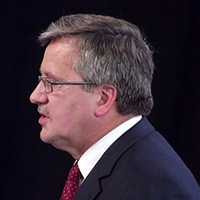On his way to the G-8 Summit in mid-June, Japanese Prime Minister Shinzo Abe made a stopover in Warsaw for his first summit with the Visegrad Group, a subregional European alliance of the Czech Republic, Hungary, Poland and Slovakia commonly called the V-4. While the gathering was held to celebrate the 10th anniversary of V-4-Japanese cooperation, a closer look reveals its deeper significance: The summit was emblematic of the growing importance of Central Europe in the international arena.
Individually, the Visegrad states, with the possible exception of Poland, are neither particularly rich nor influential. Viewed collectively, however, they have roughly the population of France, a third of Germany’s GDP and an intra-European Union voting weight equal to France and Germany combined. When acting in concert the picture is not one of relative insignificance, but rather of sizeable latent strategic potential. Bound by common geography and history, they broadly share a range of political interests—protecting free market principles, upholding trans-Atlantic political and security linkages and promoting democratic norms abroad, for example. The trick has always been to find a way to harness this region’s combined political and economic strength into a coherent strategic trajectory. And this is where the Visegrad Group comes in.
The V-4 was founded in 1991 as a cooperative platform to accelerate the region’s development and expedite accession to NATO and the EU. Once those goals were achieved, however, the group lapsed into a stretch of relative inactivity.

